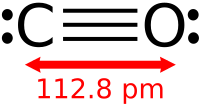
Photo from wikipedia
Abstract Sulfur dioxide, formed in combustion of sulfur-rich fuels in diesel engines, may oxidize and react with water to form corrosive H2SO4. However, the SO2 may also be absorbed in… Click to show full abstract
Abstract Sulfur dioxide, formed in combustion of sulfur-rich fuels in diesel engines, may oxidize and react with water to form corrosive H2SO4. However, the SO2 may also be absorbed in the lube oil and consume CaCO3-containing reverse micelles. In this study, the CaCO3 + SO2 reaction was investigated in a batch reactor setup at temperatures and pressures similar to those on the cylinder liner in an engine. The conversion of CaCO3 and the formation of products were determined by Fourier Transform Infrared Spectroscopy (FTIR). CaSO3 was the main product, but CaSO4 was observed at extended residence times and increased temperature. The SO2-CaCO3 reaction exhibited only a small temperature dependence; the increase in the rate constant with temperature was partly off-set because the absorption of SO2 in the lube oil emulsion decreases at increased temperature. The reaction rate increased slightly with the initial water concentration due to increased SO2 absorbance. A mathematical model for the batch reactor was set up and kinetic parameters were determined by fitting predictions to the experimental data. The model was then used to predict the CaCO3 conversion in lube oil from SO2 for conditions relevant to a full-scale engine application. Simulations showed that consumption of CaCO3 from SO2 is insignificant in a two-stroke marine diesel engine application and that the H2SO4-CaCO3 reaction is far more important than the SO2-CaCO3 reaction.